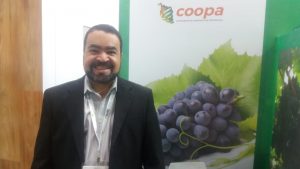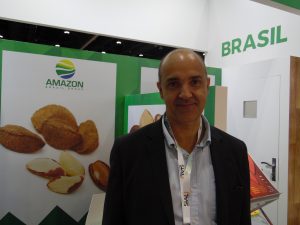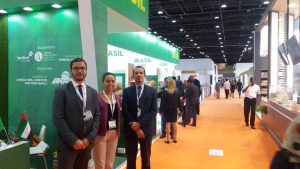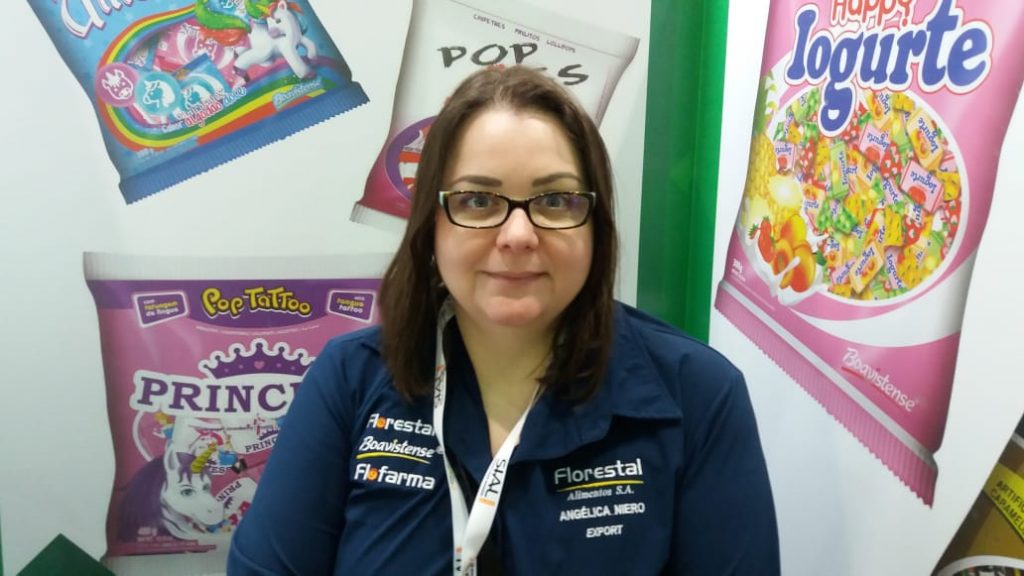Abu Dhabi – SIAL Middle East, the food industry show which ended this Wednesday (12) in Abu Dhabi, UAE wasn’t just a contact-making event for Brazilian exhibiting companies. Some of them, like the BrazilBarn group, Florestal Alimentos and trading company ALM Brazil made actual sales deals at the expo. The Brazilian Ministry of Agriculture, Livestock and Supply, which organized the Brazilian space, will disclose the value of the deals in the next few days. Last year, the show yielded USD 20 million for Brazilians, according to the Ministry.
Florestal made USD 100,000 in sales, according to its export manager Angélica Niero (pictured above). The company makes hard candy, lollipops and bubblegum in Lajeado, Rio Grande do Sul and ships to 50-plus countries, including Arab ones like Yemen and the UAE. This was its first time at SIAL Middle East. “It was interesting because I made new contacts, including with a major supermarket chain in the Gulf Cooperation Council (GCC),” Angélica told ANBA.

Florestal also got a chance to get back in touch with importers it sold product to in the past, as well as to speak with new prospective buyers. It is the leading maker of flat lollipops in Latin America. Its flagship product is tattoo lollipops: after licking on them, you press them up against your skin. The export manager says the product is hugely successful, including in Arab countries.
Minas Gerais-based group BrazilBarn saw USD 91,000 in deals at the expo, with another USD 330,000 expected in a year as a result of contacts made at SIAL Middle East, according to sales executive Gabriel Peixoto. The group comprises three companies: Gola Foods, for lyophilized fruits, nuts and açaí powder; Phyto Planet, which sells products in bulk; and the export-import concern B2Food, which carries own and third-party goods.
The group ships to over 70 countries. It has sold to Arab markets like Egypt, the UAE, Saudi Arabia, Algeria, Lebanon and Syria. Peixoto relates that most of the importers he met at SIAL were already clients, from places like India, Iran and Spain. Those were the ones that bought from him. He also made new contacts. “Even though this is a new expo, attending it was important. This is a very easy place for every importer in the region to get to,” he said.

The Petrolina Agricultural Cooperative (Cooperative Agrícola de Petrolina – Coopa) didn’t strike any deals, but its executive manager Junior Silveira was quite happy with the results. He left the show with a positive prospect of starting to sell in the region. He said visitors at the stand were very surprised upon tasting the cooperative’s BRS Vitoria table grapes. This genuinely Brazilian variety was developed by the Brazilian Agricultural Research Corporation (Embrapa). It’s an exotic tasting, seedless black grape. Coopa has 24 members which make table grapes that ship to over 20 countries plus Brazil. There are great expectations of later deals,” the executive said.
Hailing from Bebedouro, São Paulo, Apis Vida brought propolis, propolis-based products and honey to Abu Dhabi. The company sells to China, Japan and the United States. It has a showroom in Dubai and has done business there in the past. Export manager Ricardo Villela Scariot claims he’s yet to gauge the results from the contacts he made at the trade show. According to him, it was a seemingly good event, even though turnout wasn’t great. Most of the inquiries Apis Vida got concerned its honey sachets.

Amazon Brazil Group joined SIAL Middle East via Luma Foods, a Dubai-based company which carries its products in the region. In the Middle East, the Group’s nuts sell in Saudi Arabia, the UAE and Qatar. Luma Foods owner Ivan Moraes relates that the Amazon Brazil Group’s items go to local packagers and to suppliers that sell in bulk at public markets. From there, they get sold locally as well as in other countries. According to Moraes, the company joined the show for exposure, and the chance to be at the Brazilian Agriculture Ministry’s stand. They got in touch with clients old and new.
The Ministry’s general coordinator for Foreign Investments and Cooperation, Rodrigo da Matta, who led the Brazilian participation in SIAL Middle East, says the feedback he got from the companies was that results were great. Rodrigo notes that some exhibitors made sales at SIAL, while others believe sales will go through in the second half of next year as a result of the contacts they made. “We know that trade show results are not immediate,” he said. According to him, SIAL Middle East doesn’t see large numbers of visitors, but its audience is qualified. “They are people who are actually looking to do business.”

Arab Brazilian Chamber of Commerce International Business executive Fernanda Baltazar also noticed the quality of fairgoers. She gives a positive assessment of how Brazilian companies presented themselves, with a wide range of typical products that attracted visitor attention. “They are working on the image of Brazil and showing what sets the country apart,” said Fernanda. According to the executive, by taking part in this kind of initiative, the Arab Chamber has a chance to better understand the demands of Brazilian companies and to increase their foothold in Arab countries – as well as to relay the Arabs’ requirements back in Brazil.
The Brazilian Agriculture Ministry organized the Brazilian participation with support from the Brazilian Ministry of Foreign Relations, the Brazilian Trade and Investment Promotion Agency (Apex-Brasil) and the Arab Chamber. The Brazilian space was launched by UAE deputy prime minister Mansour Bin Zayed Al Nahyan, alongside Brazil’s ambassador to Abu Dhabi, Fernando Luís Lemos Igreja. Besides Rodrigo da Matta, the Brazilian Ministry of Agriculture was represented by its public policies and government administration specialist Pedro Viana.
Translated by Gabriel Pomerancblum




